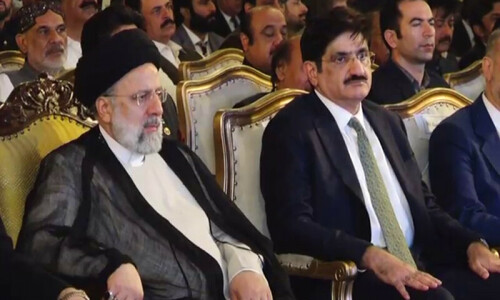
ISLAMABAD: The CIA may have focused its war on al Qaeda in Pakistan's tribal badlands but Osama bin Laden's killing exposes the limits of drone strikes and the need for Islamabad to broaden intelligence in cities.
Abbottabad, the garrison town tucked in hills where bin Laden may have lived in secret for years, is just the latest Pakistani city with a strong military presence that some of al Qaeda's most-wanted have called home.
The three-storey compound where bin Laden lived with three wives and 13 children is hundreds of miles from the Afghan border areas where the CIA last year doubled drone attacks in the war to defeat al Qaeda.
“The tribal belt was in the eye of the storm,” said Pakistani analyst Imtiaz Gul, who has written a book about the region. “This was the bullseye.”
“I personally never thought he was alive and if he would be recovered it would be from some cave. This has been a master deception that bin Laden created,” Gul said.
Pakistani security officials say they are investigating whether bin Laden lived in the compound for five years, as his Yemeni wife -- who was shot in the leg during the operation -- has claimed.
The New York Times quoted Pakistani investigators as saying that she also said the family lived for nearly two-and-a-half years in a small village, Chak Shah Mohammad, near the main highway.
That would mean bin Laden left the tribal belt in 2003 and had been living in northern urban regions for more than seven years.
“When you're trying to escape from Afghanistan, the first place you enter is the tribal area,” tribal affairs expert Rahimullah Yusufzai told AFP.
“But I think when they found out that those areas are so much under surveillance, it's not easy to stay there for long periods.”
“There are security checkpoints over there, strangers are easily identified among the tribes and there are drone attacks and occasional Pakistani military operations, so in a way they are under more surveillance on a day-to-day basis.”
Bin Laden was not the only Al-Qaeda leader tracked down to Pakistani cities, which unlike the tribal belt, are under direct government control.
In 2002, his close confidant Abu Zubaydah was arrested in Faisalabad, one of Pakistan's most moderate cities, a place known more for its textile industry than its association with global terrorism.
Alleged 9/11 plotter Ramzi bin al-Shaiba was arrested in Karachi, also in 2002, and the following year the self-confessed mastermind of 9/11, Khalid Sheikh Mohammed was held in Rawalpindi, the city headquarters of Pakistan's military.
In 2005, al Qaeda number three Abu Faraj al-Libbi was tracked down to the shrine town of Mardan and Mustafa Setmariam Nasar, wanted over the Madrid and London bombings, in the southwestern city of Quetta.
These arrests were made by or in conjunction with Pakistan's Inter-Services Intelligence agency - unlike the bin Laden killing - which Pakistan and Washington say was purely a US operation.
US officials say that finding bin Laden in Abbottabad, a city crawling with officers and home to the country's top military academy, raises serious questions about whether Pakistani intelligence agents helped protect him.
Pakistan denies complicity. Pakistani officials say the perfect cover would have been to melt into one of Pakistan's heaving cities, where millions live on top of each other.
A security official said efforts were being stepped up to set up vigilance committees in all major cities to keep a check on who is buying, selling and occupying houses.
Pakistani military operations, US aerial surveillance and CIA missile attacks in the tribal belt have increasingly made cities such as Lahore, Karachi and Faisalabad more attractive places to hide, some experts believe.
US missile attacks doubled last year, with more than 100 drone strikes killing over 670 people in 2010 after CIA director Leon Panetta said the covert programme had severely disrupted Al-Qaeda's leadership.
Tribal expert Yusufzai said the drone campaign was not effective and should be reviewed.
“Mostly, you have killed people who are not really your enemies -- low-level, unknown people, faceless people, foot soldiers. I can count on my fingers how many known people have been killed,” he said.
Gul says what helped bin Laden and other Al-Qaeda leaders survive was a “social cushion” from people brought up on the idea of Islamic jihad and determined to protect people who they think are fighting the Americans.
But Christine Fair, assistant professor at Georgetown University and a South Asian terrorism expert, said the drone war was misunderstood in Pakistan and was effective in eliminating Al-Qaeda operatives.
“The big problem is because the Americans want to keep this covert there's no transparency... that says 'this is the person who was killed, this is this person's role in such and such organisation, this is what this person did in terms of operations' - in other words why did this person merit being targeted,” she said.












































Dear visitor, the comments section is undergoing an overhaul and will return soon.